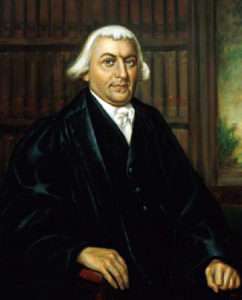The Volokh Conspiracy
Mostly law professors | Sometimes contrarian | Often libertarian | Always independent
Today in Supreme Court History: May 12, 1790
Editor's Note: We invite comments and request that they be civil and on-topic. We do not moderate or assume any responsibility for comments, which are owned by the readers who post them. Comments do not represent the views of Reason.com or Reason Foundation. We reserve the right to delete any comment for any reason at any time. Comments may only be edited within 5 minutes of posting. Report abuses.
Please to post comments



Rhode Island v. Innis, 446 U.S. 291 (decided May 12, 1980): armed robbery defendant, after being given Miranda warnings and riding in police car, should have been given additional Miranda warning before officer's comment that missing shotgun might be picked up by children in nearby school for the handicapped which prompted defendant to ask the police to take him back to the scene to find the shotgun, evidence of which should have been suppressed (!)
Reno v. Bossier Parish School Board, 520 U.S. 471 (decided May 12, 1997): preclearance of proposed redistricting (§5 of the Voting Rights Act) is not necessarily denied if there is intentional vote dilution (§2) because purpose of §5 is to prevent retrogression to earlier discrimination (§5 is now a dead letter now that §4(b) was invalidated in Shelby County v. Holder, 2013)
Johnson v. United States, 520 U.S. 461 (decided May 12, 1997): materiality of defendant's false statement to grand jury (i.e., source of box of cash which she knew was really the result of drug trafficking) should have been question for the jury in perjury trial but harmless error because evidence of materiality was "overwhelming"
Bugajewitz v. Adams, 228 U.S. 585 (decided May 12, 1913): determination that petitioner had entered country to practice prostitution and therefore would be deported did not require evidence of conviction of prostitution in home country
Gonzalez v. United States, 553 U.S. 242 (decided May 12, 2008): consent of counsel, and not of his client, sufficed to allow magistrate (and not judge) to preside over voir dire in felony case
Cuyler v. Sullivan, 446 U.S. 335 (decided May 12, 1980): defendant sharing counsel with other defendants was entitled to Fourteenth Amendment protections in state criminal trial, but under Sixth Amendment right to Assistance of Counsel trial court must inquire only into any actual (not potential) conflicts of interest between defendants
Cappie. What a bunch of nitpicky pro criminal garbage decisions divorced from reality. This Supreme Court is a disgraceful and toxic court. It is a threat to crime victims.
They don't care, captcrisis.
They're just trying to peddle a right-wing textbook to a downscale, partisan audience. They figure this white, male blog is likely to attract their target audience, and that those clingers are concerned far more about stale ideological crusading than about scholarship standards or academic quality.
Look at the bright side -- this rubbish could persuade Georgetown to refrain from enabling another movement conservative to misappropriate and dilute the school's franchise!
(No need to wallow in the paltry when there is so much better to be found and enjoyed.)
captcrisis, keep posting the cases, I find your information interesting and educational.
Thanks! Yes, I will. I was thinking nobody else was reading these.
Yeah, it's made me start clicking on these every day when I used to skip them.
The Rhode Island one is interesting.
Indeed. I wonder if it is (or was) a common police tactic to use such comments to elicit incriminating information, and whether false information was sometimes used.
I've been to the neighborhood involved in that case, Mount Pleasant in Providence. It's working class, semi-attached triple-decker houses. My in-laws live there. Providence in general is a unique and interesting place.
There is indeed a school for disabled children there, part of the high school, called Harold A. Birch School. Perhaps Mr. Innis was aware of the school and knew the policeman's concern as to disabled children picking up his gun was a legitimate one.
The answer is yes, regardless of what you fill in the blank with.
Iredell was the lone dissenter in Chisholm v. Georgia. The states and Congress must have agreed with him because the Eleventh Amendment followed pretty quickly. Not a bad Justice at all, just obscure and he died young.